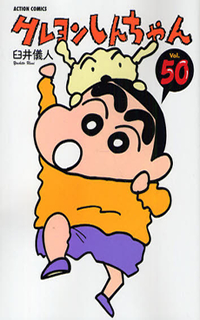Crayon Shin Chan Manga Raw Download

'Animation Japanese Manga Cartoon - Crayon Shin-Chan cotton T-shirt 'Shinchan with Whitey' - Size S, M, L, XL, XXL & 6 Colors (Dt8)' Bento Kids Bento Lunchbox Bento Food Bento Box Lunch Kawaii Bento Cute Bento Japanese Lunch Box Japanese Food Japanese Design.
LUK Internacional: (2016–present) Original run April 13, 1992 – present Episodes 970 () Manga New Crayon Shin-chan Written by UY Team Published by Demographic Imprint Action Comics Magazine Manga Town Original run August 2010 – present Volumes 8 () Anime television series Super Shiro Directed by Tomohisa Shimoyama Written by Kimiko Ueno Studio Science Saru Episodes 48 Crayon Shin-chan (: クレヨンしんちゃん,: Kureyon Shin-chan), also known as Shin Chan, is a Japanese series written and illustrated. It follows the adventures of the five-year-old Shinnosuke 'Shin' Nohara and his parents, baby sister, dog, neighbours, and friends and is set in, of Japan. Crayon Shin-chan first appeared in 1990 in a Japanese weekly magazine called, which was published. Due to the death of author, the manga in its original form ended on September 11, 2009. 
A new manga began in the summer of 2010 by members of Usui's team, titled New Crayon Shin-chan ( 新クレヨンしんちゃん, Shin Kureyon Shin-chan). An adaptation of the series began airing on in 1992 and is still ongoing on several television networks, worldwide. The show has now been dubbed in 30 languages which aired in 45 countries, has over 970 episodes and 26 full-length films. More than 100 million copies of the manga have been sold worldwide. An anime spin-off titled Super Shiro has been announced to be released in early 2020, produced by and Science Saru.
Train in special Crayon Shin-chan vinyl wrapping livery at Kurihashi Station, Japan Many of the jokes in the series stem from Shin-chan's occasionally weird, unnatural and inappropriate use of, as well as from his mischievous behaviour. Consequently, non-Japanese readers and viewers may find it difficult to understand his jokes. In fact, some of them cannot be translated into other. In, certain almost always accompany certain actions; many of these phrases have standard responses. A typical gag involves Shin-chan confounding his parents by using the wrong phrase for the occasion; for instance, saying 'Welcome back' ('おかえりなさい' 'okaeri nasai') instead of a using a more suitable wording such as 'I am home' ('ただいま' 'Tadaima') when he comes home. Another difficulty in translating arises from the use of Japanese words.
In scolding Shin-chan and attempting to educate him in proper behaviour his parent or tutor may use such a phrase to indicate the correct action. Often through misinterpreting such a phrase as a different, though similar-sounding phrase, or through interpreting it in one sense when another is intended, Shin-chan will embark on a course of action which, while it may be what he thinks is being requested of him, leads to bizarre acts which serve only to annoy his parents or tutors even more. This is not restricted to onomatopoeic words, since almost any word can become a source of confusion for Shin-chan, including English loanwords, such as mistaking 'cool' for 'pool' ('That's pool!' Or 'Pu-ru da zo!' ('プールだぞ!') for 'That's cool!'